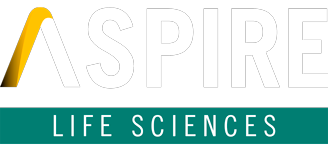In conversation with James Leighton-Scott
This week, we chatted with James Leighton-Scott, an experienced senior leader who most recently held the role of Senior Vice President Medical at Mundipharma Research Limited, about his start in the Pharmaceutical industry, his journey to a senior role at Mundipharma and his achievements in that role, his thoughts on the evolution of the Pharmaceutical sector, and his advice for those wanting to follow a similar path.
“At any stage in your career, you need to be yourself. If your workplace doesn’t like who you are and you try and become a different person for them, you’ll become unhappy, but if your workplace is the right one for you and you can be authentic, you will succeed. ” – In conversation with experienced senior leader James Leighton-Scott.
In line with Aspire Life Sciences’ core belief in the power of sharing talent and experiences to drive improvement and embrace innovation, we’ve asked professionals working in the Life Sciences sector to share a few insights with us.
This week, we chatted with James Leighton-Scott, an experienced senior leader who most recently held the role of Senior Vice President Medical at Mundipharma Research Limited, about his start in the Pharmaceutical industry, his journey to a senior role at Mundipharma and achievements in that role, his thoughts on the evolution of the Pharmaceutical sector, and his advice for those wanting to follow a similar path.
Can you tell us a bit about how you started out in the Pharmaceutical industry?
Back when I was studying to be a doctor and working as a House Officer at Barts Health NHS Trust, I thought the only decision I had was whether to stay in specialised medicine or become a GP—I didn’t know there was any other career available to me. I completed my training to become a fully registered doctor, got married, and went travelling, but when I came home, I knew I needed to apply for my next job.
I wanted to do surgery, so I applied for some surgical rotations, but there was a six-week interview and shortlisting process, so I contacted a locum agency. I was expecting to do locum placements in hospitals, but they explained that the Pharmaceutical industry needed medics to help them with research. I was quite surprised by that, and it wasn’t a job I’d ever considered, but it sounded interesting, so I decided to go along to an interview.
I interviewed with a company called LCG Bioscience Limited, and I found that I really liked what the job seemed to involve, and I wanted to work in an environment where people treated each other equally and with respect. To be able to do that in an environment where I’d still be working with volunteers in Phase One trials, using my medical expertise to monitor their health and safety, and adding value by developing new drugs, was fascinating.
I went into LCG as a Clinical Research Physician, loved it, did it for two years, and stayed in Pharma for the rest of my career. I knew nothing about it at first, but it shaped my whole career after that. I think it’s important to be open to opportunities you’re not expecting rather than just shut them off because they’re not part of your original plan. By being open, I had the opportunity to be in an environment where the culture was about empowerment, treating people with respect, and allowing them to learn and develop without fear.
What about your Mundipharma journey? Can you tell us more about that?
I started at Mundipharma as part of the Drug Safety team, gaining experience as a Medical Advisor , and then started to develop a Safety Surveillance and Risk Management team, which I loved.
As time went on, we merged multiple different Drug Safety teams to create a single global Safety team, which I then led for about four years. I was very proud of that, especially given how successfully we managed to merge teams from different cultures to work so well together and become so close-knit despite the cultural and physical distance between us. Thanks to our efforts, the Drug Safety team was a place people wanted to work in, because they’d heard great things about the culture of the team, the support, the development, and the fact that we empowered people to lead at any level.
Another point of pride of mine is the diversity and inclusivity of the teams we built. As a leader, I’ve always sought feedback from my teams about whether we are inclusive, open, and whether people are finding that they have equal opportunities for progression or not, and that has always resulted in very strongly positive feedback from diverse and happy teams of all sizes, even in anonymized surveys where people could truly say what they thought.
I think that being a leader in the Drug Safety days really helped me develop the skills I needed to get to a leadership role, because it gave me the opportunity to learn from other leaders around me, build teams from scratch, and integrate with other teams. It also allowed me to begin transforming the operating model for the business, as we started outsourcing some of our Safety work, and many of the roles I’ve gone onto since have had a transformative capacity to them. It was my formative experience in terms of learning what sort of culture was going to be the most successful in allowing people to deliver value to a business.
For me, Mundipharma was the perfect place to go through a lot of that growth and development. When I first joined, I expected to be there for a couple of years to get some experience and move on for more learning, but the reason I stayed for so long is that they always provided new opportunities for growth, learning, and development that kept my interest. They also had a strong culture of valuing people for their strengths and empowering people to make decisions that allow them to be authentic rather than change who they are to fit in with the corporate environment, which I am a big believer in myself.
Do you have any tips for managing both small and large teams and adapting your leadership approach to suit different groups?
Whether you’ve got a team of two or a team of 300, your culture is incredibly important. I’ve always believed in radical transparency and being open and honest about as much as possible within the business, because that fosters greater trust. I also feel very strongly that leaders shouldn’t be autocrats who decide everything. Instead, I’ve always held the belief that we should aim for a meritocracy where the best idea drives the direction you go in, no matter what level that idea comes from.
When you’re setting targets, talk to your team about it. You can run workshops around setting a target and the direction your team will go in to achieve it, and invariably you will end up heading in the right direction as a group, and your team will often have new ideas and concepts you wouldn’t have thought about alone. By setting those objectives and targets together, your team will own them, and that makes them much more responsible for delivery and motivated to deliver.
No matter the size of the team, it’s important that people feel they can come and talk to you at any point if they have a problem. That does get more challenging as teams get bigger, but I think it’s really important to break down hierarchy in terms of accessibility and communication so that all members of your team get an equal opportunity to speak to you.
With that said, as your team gets bigger, you’ve got to create a structure that allows it to be managed and led effectively. You can’t level hierarchy completely, but you need to make sure you set up the right sub-teams and have the right people leading them.
As well as team management, what other key themes and challenges have you experienced in the Pharmaceutical sector, and how do you see the Life Sciences industry evolving?
I think that in today’s environment, we have to focus more than ever on maximising efficiency and driving down costs to be successful, and from a Research and Development perspective, that also means doing everything we can to reduce expenditure on clinical trials that fail.
We’re also seeing a real shift towards the idea of personalised medicine. One treatment doesn’t fit all, because every patient’s disease experience is different in terms of their symptoms, objectives, mental wellbeing, and treatment needs. As we move forward, we’ll need to be able to adapt as an industry to giving people personalised treatments and working with patients in a partnership where they’re in change of their own treatment rather than telling them what we think is best for them. In the Research and Development space, that means we have to consider not just health professionals as our end customers, but patients themselves.
In line with that, we’re seeing huge advances in patient technology from monitoring our bodies to treating our illnesses, and I think there is a massive opportunity to merge that patient focus with technology. There is a huge wealth of ideas and knowledge from patients about what they want and need to make their lives easier, so we need to be involving patients in developing medicines and technology, and hearing the needs and ideas of those suffering from the diseases we are trying to treat.
Our industry will often look to put a technical expert in charge of a team because of their experience and capabilities when it comes to understanding the work, but that’s an incredibly outdated way of running a business. In reality, I think you need a people expert managing a team. It’s about setting the right targets, direction, focus, and culture, so choose your leaders carefully as your company grows. So much else falls into place once you get your leadership right, and in modern, thriving pharmaceutical companies, we should understand exactly what we’re looking for in different positions.
The final theme I’ve seen across the sector is one of compliance. I’ve had a lot of experience with the regulatory side of the Pharmaceutical sector, and therefore a lot of experience with compliance. I’m seeing a really positive trend of understanding the importance of good pharmacovigilance practice, good clinical practice, and good business ethics. I think we should be proud of working in an industry that has strengthened its ability for compliance and genuinely wants to benefit patients.
Is there any advice you would offer to others coming up through the Pharmaceutical industry or looking to become large-scale leaders themselves?
It’s important to remember that leadership isn’t about you as an individual, but about getting the best for your business and creating an environment that allows your team to deliver to the best of their ability as well as develop and be self-empowered and authentic. If you can achieve that, your team will be far more likely to hit their targets. Targets are important, but if you don’t have the right culture to enable people to reach them, they won’t deliver.
As part of that, be careful to avoid micromanagement and control in your leadership, as that doesn’t allow people to produce their best work. People want to hear they’re trusted, and valued for their strengths, and if you build that trust and ensure they’ve got the right training and skills to do so, they will go away and do a good job with that trust and support.
Good leaders understand each individual in their teams and what they are best at and get them to focus on that, and to do so, you need a diverse range of personalities, skills, and capabilities, and you need to ensure people have the same opportunities regardless of gender, sexuality, and ethnicity.
At any stage in your career, you need to be yourself. If your workplace doesn’t like who you are and you try and become a different person for them, you’ll become unhappy, but if your workplace is the right one for you and you can be authentic, you will succeed.
As I said earlier, you also need to be very flexible to opportunities as they come up, because things will come up that you haven’t predicted, and in some cases, if you say no to those opportunities, you’re possibly turning down stuff that’s really valuable for your development.
From a personal perspective, another really important thing is learning. In every role you do, think about what it is you’re going to learn from it and how you can add value to the business using that learning. The more somebody learns, the greater skills and capabilities they bring to the business, and the more they do that, the more the business will take an interest in them. If you can foster a relationship with your business, it will benefit everybody; regardless of whether you’re a team member or a team leader.
Working in Research and Development can be tough, but if you have a strong culture and a supportive environment where you can also come together to have honest conversations and a bit of fun where you can, you solve things together, and everything becomes more manageable.




